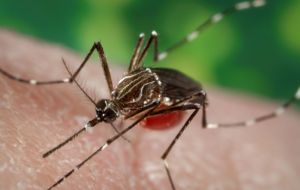MercoPress. South Atlantic News Agency
Pan American Health Organization statement on Zika virus transmission and prevention
 Two main reasons for the virus's rapid spread: (1) the Americas population lacks immunity to Zika and (2) Aedes mosquitoes are present in all the region's countries
Two main reasons for the virus's rapid spread: (1) the Americas population lacks immunity to Zika and (2) Aedes mosquitoes are present in all the region's countries Zika is a mosquito-borne virus that is new to the Americas. Since Brazil reported the first cases of local transmission of the virus in May 2015, it has spread to 21 countries and territories* of the Americas (as of 23 January 2016).
There are two main reasons for the virus's rapid spread: (1) the population of the Americas had not previously been exposed to Zika and therefore lacks immunity, and (2) Aedes mosquitoes—the main vector for Zika transmission—are present in all the region's countries except Canada and continental Chile.
PAHO anticipates that Zika virus will continue to spread and will likely reach all countries and territories of the region where Aedes mosquitoes are found.
The most effective forms of prevention are (1) reducing mosquito populations by eliminating their potential breeding sites, especially containers and other items (such as discarded tires) that can collect water in and around households; and (2) using personal protection measures to prevent mosquito bites (see also recommendations below).
The role of Aedes mosquitoes in transmitting Zika is documented and well understood, while evidence about other transmission routes is limited. Zika has been isolated in human semen, and one case of possible person-to-person sexual transmission has been described. However, more evidence is needed to confirm whether sexual contact is a means of Zika transmission.
Zika can be transmitted through blood, but this an infrequent mechanism. Standard precautions that are already in place for ensuring safe blood donations and transfusions should be followed.
Evidence on mother-to-child transmission of Zika during pregnancy or childbirth is also limited. Research is currently under way to generate more evidence regarding perinatal transmission and to better understand how the virus affects babies.
There is currently no evidence that Zika can be transmitted to babies through breast milk. Mothers in areas with Zika circulation should follow PAHO/WHO recommendations on breastfeeding (exclusive breastfeeding for the first 6 months, followed by continued breastfeeding with complementary foods up to 2 years or beyond).
Other PAHO recommendations:
To prevent or slow the spread of Zika virus and reduce its impact, PAHO recommends the following:
• Mosquito populations should be reduced and controlled by eliminating breeding sites. Containers that can hold even small amounts of water where mosquitoes can breed, such as buckets, flower pots or tires, should be emptied, cleaned or covered to prevent mosquitoes from breeding in them. This will also help to control dengue and chikungunya, which are also transmitted by Aedes mosquitoes. Other measures include using larvicide to treat standing waters.
• All people living in or visiting areas with Aedes mosquitoes should protect themselves from mosquito bites by using insect repellent; wearing clothes (preferably light-colored) that cover as much of the body as possible; using physical barriers such as screens, closed doors and windows; and sleeping under mosquito nets, especially during the day when Aedes mosquitoes are most active.
• Pregnant women should be especially careful to avoid mosquito bites. Although Zika typically causes only mild symptoms, outbreaks in Brazil have coincided with a marked increase in microcephaly—or unusually small head size—in newborns. Women planning to travel to areas where Zika is circulating should consult a healthcare provider before traveling and upon return. Women who believe they have been exposed to Zika virus should consult with their healthcare provider for close monitoring of their pregnancy. Any decision to defer pregnancy is an individual one between a woman, her partner and her healthcare provider.
•
PAHO is working with its member countries to strengthen vector-control, communicate the risks of Zika and promote prevention, and establish or improve surveillance of both Zika virus infections and suspected complications, such as microcephaly, Guillain-Barre syndrome, and other autoimmune and neurological disorders.
* Barbados, Bolivia, Brazil, Colombia, the Dominican Republic, Ecuador, El Salvador, French Guiana, Guatemala, Guadeloupe, Guyana, Haiti, Honduras, Martinique, Mexico, Panama, Paraguay, Puerto Rico, Saint Martin, Suriname and Venezuela.





Top Comments
Disclaimer & comment rulesCommenting for this story is now closed.
If you have a Facebook account, become a fan and comment on our Facebook Page!